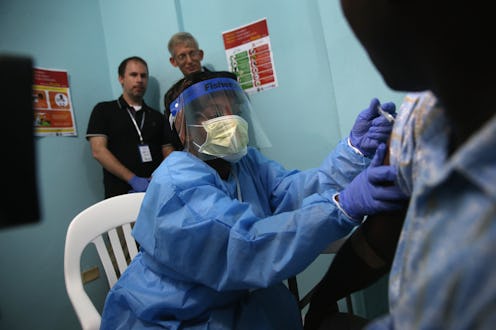News
Two Americans In West Africa Have Caught Ebola

UPDATE: Sierra Leone's preeminent doctor working to fight the West African outbreak, Dr. Sheik Umar Kahn, has died from the Ebola virus. Hailed as a national hero by his government, Khan was only 39 years old, and helped hundreds of Ebola-infected patients before succumbing to the disease himself.
Each day, the news out of West Africa gets worse. Two Americans have now been infected with Ebola in Liberia while combating the deadly disease, yet another indication that this massive public health crisis is worsening. One, Dr. Kent Bradley, was working for aid group Samaritan's Purse to provide medical treatment for others stricken with the disease, while the other, Nancy Writebol, was helping the effort as a member of the aid group Serving in Mission. Both, according to the AP, are in serious but stable condition.
You've probably read about the outbreak of Ebola across West Africa before — it's been an issue since February, and the most recent estimate from the World Health Organization reports a total death toll of 672, with 1,201 people afflicted. This is, however, the first time that Americans have fallen prey to the outbreak, though both are receiving appropriate medical treatment.
Sadly, by the numbers, their chances for recovery aren't great. However, they're much better than in the past — according to NBC News, the rate of death in this outbreak has been around 60 percent, as opposed to the staggeringly high rates of death, around 90 percent, seen in other outbreaks. Melissa Strickland, a spokesperson for the medical aid group Bradley worked for, Samaritan's Purse, told NBC News that proper protective procedures were followed.
Our team has followed to the letter all of the protocols for safety that were developed by the CDC and WHO. At this time we have not been able to confirm 100 percent the method of contagion
From the sounds of things, you have to hand it to Bradley for his determination in the face of a horrible diagnosis — he's reportedly been in good enough condition to continue his anti-Ebola work on his computer while confined to a hospital bed. Woah.
As Strickland acknowledges, it's not precisely known how he or Writebol, who was also working with Samaritan's Purse doctors, were infected with the disease. In light of their close proximity, though, it's easy to understand how it could have happened.
Ebola is hyper-contagious through contact with bodily fluids, and the disease's symptoms tend to produce many such fluids — Ebola can cause external bleeding, vomiting, and diarrhea. The sole silver lining is that it can't be transmitted through the air. Bradley was working directly with infected patients, while Writebol helped decontaminate doctors after their work was done for the day.
The fact that these two are Americans is predictably causing a stir — so far, the spread of the disease hasn't gotten out of Africa. But it is moving from one African nation to another, as highlighted by Patrick Sawyer, an Ebola-infected Liberian man who disembarked a plane in Lagos, Nigeria, last week before collapsing. He subsequently died in the hospital.
Prior to the news of these two Americans falling ill, multiple news sources have reported on the potential for Ebola to spread to the United States. As Vox reported, this is unlikely, and in spite of these two recent infections within Africa, it should still be considered as such. While an infected person could potentially carry the virus stateside by means of a plane flight, as NPR reported, there have actually been instances of Ebola-suffering air travelers who haven't transmitted the illness to anybody else.
Even further, in the event the disease did make it to America, the public health response wouldn't be laboring under the same dire circumstances present across many of the currently stricken African states. The prevalence of misunderstanding, fear, and people's reluctance to seek proper treatment for Ebola has proven disastrous in West Africa, with some infected patients spurning hospitals to stay hidden in their houses.